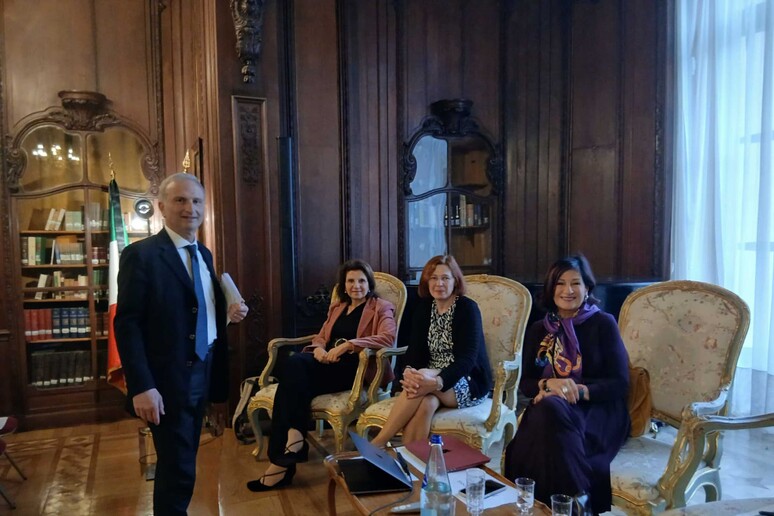The Permanent Representation of Italy to the International Organisations in Paris organised two events to mark Italian Research Day in the World, an initiative promoted by the Farnesina involving the entire diplomatic-consular network.
On Thursday 24 April, a round table dedicated to Italy's major international research infrastructures in the field of fundamental physics took place at the OECD headquarters. The event was attended by the directors of the main research centres active in Italy, representatives of the National Institute of Nuclear Physics (INFN), delegates from member countries and officials from the Organisation's scientific directorate.
Seven leading figures in international scientific research took the floor: Elena Aprile, Director of the Institute of Astrophysics at Columbia University (New York); Massimo Carpinelli, Director of the Virgo/EGO laboratory for the study of gravitational waves in Cascina (Pisa); Rosa Coniglione, Scientific Director of the KM3NeT neutrino telescope in Capo Passero; Fernando Ferroni, Co-Director of the Einstein Telescope project; Paola Gianotti, Director of the National Laboratories of Frascati; Marco Pallavicini, Vice-President of INFN; and Enzo Previtali, Director of the Gran Sasso National Laboratories.
The discussion analysed the strategic role of large infrastructures in responding to the most urgent global challenges, with particular attention to their scientific, economic, social and geopolitical impact. The most recent results obtained in Italy were recalled: the KM3NeT submarine neutrino telescope announced the detection of cosmic neutrinos of unprecedented energy, while the Virgo detector was the protagonist of the first observations of gravitational waves.
During the debate, it was emphasised that these facilities represent powerful engines of cultural and economic growth, promoting innovation, fostering international collaboration and contributing to the development of territories. Italy has confirmed itself as a privileged environment for global scientific research, thanks to the consolidated know-how and openness demonstrated in the management of strategic infrastructures, from the Gran Sasso Laboratories to those in Frascati and the South.
A meeting, organised in collaboration with the Consulate General in Paris, was also held on today's date. The protagonist was female physics, with the presence of three world-famous Italian women scientists who are shaping our understanding of the universe and who also animated this second event. They are Elena Aprile, a pioneer in the field of particle physics and leader of the XENON dark matter experiment, the largest experiment located in the National Laboratories under the Gran Sasso; Rosa Coniglione, scientific director of the KM3NeT project, the 1 cubic kilometre detector immersed in the waters off Capo Passero in Sicily, an experiment at the frontier of neutrino physics and astrophysical observations; and Paola Gianotti, one of the leading figures at CERN in Geneva and in research into the mysteries of matter and antimatter, now director of the National Laboratories of Frascati, Italy's most important national fundamental physics laboratory.
The three women scientists animated a lively discussion, capturing the interest of the audience with their presentations on current and future initiatives in fundamental physics: from large neutrino telescopes to detectors capable of finding the unknown 'dark matter' that dominates the composition of the universe, to the future Einstein Telescope, the largest gravitational wave detector ever built, which could be located in Sardinia.
Ambassador Luca Sabbatucci, on the sidelines of the events organised by the Representation, emphasised that 'Italy has a scientific heritage that is almost unique in the world, consisting of infrastructures of excellence and world-renowned scientists. With our initiatives, implemented at the instigation of the Farnesina, we wanted to celebrate, in the multilateral panorama in Paris, precisely that which makes us proud of our scientific knowledge. And we have done so,' continued the Ambassador, 'also by highlighting how this excellence rests on solid pillars, such as the female scientists who literally enlightened the audience over these two days.
ALL RIGHTS RESERVED © Copyright ANSA











